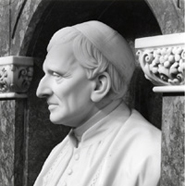St John Henry Cardinal Newman
St John Henry Cardinal Newman
First Rector, Catholic University: 1854 – 1858
 Born in Ealing, London on 21 February 1801, John Henry Newman began his religious life as a member of the Anglican Church, becoming a leader of the Oxford Movement and a national figure, as well as a Rector of St. Mary the Virgin Anglican Church in Oxford.
Born in Ealing, London on 21 February 1801, John Henry Newman began his religious life as a member of the Anglican Church, becoming a leader of the Oxford Movement and a national figure, as well as a Rector of St. Mary the Virgin Anglican Church in Oxford.
Converting to Roman Catholicism in 1845 proved to be a controversial move with his contemporary, the novelist and Anglican Minister, Charles Kingsley going so far as to question the honesty of his conversion. Deeply offended by this, Newman replied to Kingsley’s accusation by publishing a series of weekly pamphlets, which later became his autobiographical work Apologia Pro Vita Sua.
In 1851 Newman came to Ireland at the invitation of Paul Cullen, Archbishop of Dublin to be the rector of the Catholic University; he was rector until 1858. One of his first actions in this new role was to deliver lectures in the Rotunda, Dublin on five consecutive Mondays during May and June 1852. When later published, these lectures formed part of the ‘Discourses’ of his book The Idea of a University.
Newman and Cullen agreed that the university should begin modestly with Newman opting for the familiar Oxford style of obtaining a number of houses, which would be used as halls of residence and colleges of the university. The university opened with three houses: 86 St Stephen’s Green – also known as St Patrick’s or University House; 16 Harcourt Street – known as St Lawrence’s and 6 Harcourt Street – Newman’s own house that he also supervised, known as St Mary’s. Under Newman’s instruction, each house had its own chapel and common table.
Newman commissioned architect John Hungerford Pollen to design the beautiful University Church, beside 86 St Stephen’s Green, which was opened in 1856. As well as being used for religious services, it was used for public university events and functions, such as the opening of academic sessions and the presentation of awards.
It has been suggested that Newman suffered from many distractions at the university where he:
Spent his precious time carving meat for some thirty hungry students…The humble labours to which Newman subjected himself, no less than the enduring products of his intellect, were all undertaken for the benefit of the Catholic University. Such tireless effort deserved far greater success than Newman himself, in his modesty ever felt he had achieved.¹
Irish secondary schools were not producing sufficient numbers of students qualified to attend the university, and to make matters worse for Newman’s university, its degrees were not recognised by the state, unlike Trinity and the Queen’s Colleges. As a result, the university received no state funding.
During his tenure as rector, Newman was committed to recruiting educated laity to the teaching staff of the university, saying the church would look foolish without them. He recognised the need for professional schools within the university. As well as establishing the Catholic University Medical School, Newman also proposed a Faculty of Law and appointed a Professor of Engineering. Understanding the importance of a university to the wider community, another milestone of Newman’s was his introduction of the first evening lectures for students who were employed during the day.
Regardless of these many accomplishments, following his resignation as rector for the university, Newman felt a sense of failure, frustrated that he didn’t meet his and Cullen’s objective of creating the intellectual headquarters for Catholics of the English-speaking world.
As University College Dublin has evolved, the name of Newman has never been forgotten with our indebtedness to him often, gratefully and proudly, recalled.
His writings are studied even more today than during his lifetime and there are strong prospects for his eventual beatification and sainthood.
1 - Donal McCartney, UCD – A National Idea. The History of University College Dublin